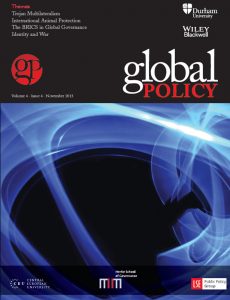The UK Election: How to lose friends (and still influence people)

DON’T DROP IT! By Wikipedia Loves Art participant “VeronikaB” [CC BY 2.5 (http://creativecommons.org/licenses/by/2.5)], via Wikimedia Commons
We’ve seen this for the last month or so, particularly by the main three party leaders Cameron, Miliband and Clegg, who need to come across as inoffensive, as prime ministerial, and who basically need to grab as many votes as possible in this knife-edge vote today, forever avoiding risks. We can see this by the fact that there have been so few moments in this campaign when the party leaders have exposed themselves directly to questions from the public, lest something goes very wrong.
It’s been strange then, and quite refreshing, to see a few politicians bucking this trend – attempting to win votes and seats by being as offensive and prickly as they can get away with. It’s an interesting strategy, and one which might well affect the result when all the votes are counted tomorrow.
First up, UKIP’s leader Nigel Farage, our ever-reliable source of ‘You said what?’ quotes, purposefully designed to create headlines, annoy certain people, and motivate others. Where shall we begin? Back in December there was the assertion that he missed the UKIP Welsh conference because of being delayed by traffic caused, he claimed, by high levels of immigration. In the Leaders TV debates last month, Nigel went a step further when he claimed the NHS was being overwhelmed by foreigners with HIV. Recently he said that reducing immigration would allow children to play out on the streets more (presumably because Farage would also deport all foreign cars (and playstations) as well as foreign people).
Commenting on the NHS/HIV comments, which were controversial even by UKIP standards, the New Stateman’s Rafael Behr said it was probably a pre-planned tactical decision – to let off a rhetorical ‘stink bomb’ in the debate which would rile up his opponents. They would then be compelled to try and outdo each other in expressing their outrage, condemning Farage, and allowing him to appear as the ‘common-sense’ victim-underdog in a room full of politically-correct liberals. Meanwhile, for some people watching on TV at home, that ‘stink bomb’ might actually smell quite fragrant, and all the more so for being divisive and unpopular with the mainstream politicians and press. The more UKIP piss off their enemies, the more their supporters love them for it.

By Euro Realist Newsletter (Flickr: Nigel Farage) [CC BY-SA 2.0 (http://creativecommons.org/licenses/by-sa/2.0)], via Wikimedia Commons
It would be hard for any politician to not be buoyed with confidence by such a surge in popularity. It seems as though this confidence has allowed them to say things which, again, are designed to provoke their enemies, and galvanise their supporters in the process. The beauty of this tactic for the SNP is that their supporters are based in Scotland, and their enemies are, largely, not. Their enemies cannot vote against them. So when Alex Salmond tells the BBC, quite cockily, that the SNP could ‘lock out the tories’ by voting down a conservative Queen’s Speech if the SNP held the post-election balance of power, he is playing a shrewd game. He is deliberately provoking an anti-SNP backlash, because the more English people complain about the Scots “trying to sabotage the democratic will of the British people”, the more that Scots will be inclined to support the party that has their back – the SNP. For a separatist party, the strategy of losing friends and still influencing people seems to be working perfectly. The more they are vilified by unionist politicians and the press, the more their poll rates seem to soar.

The Sun’s mocked-up picture of Nicola Sturgeon in March. The SNP received a boost in the polls days later.
UKIP and the SNP have their own, rather specific, group of supporters for whom this strategy might be profitable. For Labour and the Conservatives, who are each putting up over six hundred candidates around the country, it is much harder to risk being so divisive or provocative. I recently attended the Political Studies Association annual conference, where esteemed psephologists John Curtis and Rob Ford talked about how the main parties are really struggling to maintain both their old and young supporters, who each have quite converging sets of values, and who each want very different policies from their parties. Young/old, home-owners/renters, pensioners/students, white/blue collar, socially conservative/liberal – there are so many cleavages that it’s becoming more problematic for the large parties to bridge the gap(s). In the future Ford argued, it looks increasingly difficult to see how Labour and especially the Conservatives can hold their support together.
As society becomes ever more fragmented and atomised, politics seems more amenable to small parties who can afford to cater for niche tastes, rather than the politics of ‘mass consumption’ offered by the main parties. Yet, like it or not, we do need a government which will rule for the many, not the few. Laws are only passed if a majority of MPs vote for them. Electioneering might be possible through annoying and provoking rivals, but governing requires consensus and negotiation. In the coming hours and days, either Cameron or Miliband will have carried the ming vase across the highly polished floor, scraping into Number 10 with the most pitiful of electoral mandates, and then forced to forge alliances with their erstwhile rivals. After a campaign which has been antagonistic and at times ‘smelly’, it will be interesting to see if or how consensus can be achieved in the cold post-election light of day. In the longer-term future, it will be a bigger challenge to see how big parties can possibly maintain their hegemony. Perhaps the days of triangulation are becoming a thing of the past, and our politicians will realise that they can’t be everybody’s friend any more.






